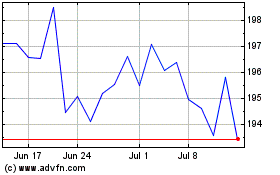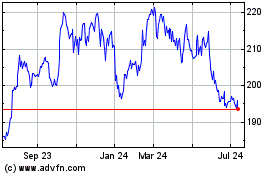Competition In OTC Clearing Comes With Its Own Risk - ICE CEO
October 22 2009 - 1:17PM
Dow Jones News
The top executive of IntercontinentalExchange Inc. (ICE) warned
Thursday that price competition among clearinghouses could increase
market risk in over-the-counter derivatives markets.
ICE, CME Group Inc. (CME), Deutsche Boerse's (DB1.XE, DBOEF)
Eurex unit and other futures exchanges are jostling to grab a piece
of the potentially lucrative business of clearing OTC transactions,
an attempt to reduce systemic risk in off-exchange markets.
ICE has taken the early lead, clearing more than $3 trillion in
credit default swaps since launching its service in March, but it
is facing competition from rivals looking to offer similar services
at a lower price.
In an interview on the sidelines of an industry event in
Chicago, ICE CEO Jeffrey Sprecher warned that this could leave some
clearinghouses dangerously undercapitalized, raising the prospect
that the Federal Reserve or other central banks could be forced to
step in if a crisis breaks.
But with multiple exchanges and clearing entities targeting the
market, Sprecher said, "I don't know how we avoid a race to the
bottom."
Clearinghouses serve as the buyer to every seller and the seller
to every buyer, and the model is seen as an antidote to the risk
posed by swap transactions, which are typically arranged privately
between two parties.
Collateral must be pledged to the clearinghouse to back up
positions in the event of a default, but Sprecher said that the
pressure to compete could prompt some clearinghouse operators to
require less collateral, making it cheaper for customers to do
business.
Clearing over-the-counter products is the single biggest growth
prospect for the derivatives exchange industry, which has struggled
with a broad downturn in trading volume spurred by the global
financial crisis.
While the current focus is on constructing clearing services for
over-the-counter markets as they exist now, Sprecher said the
standardization necessary to move OTC products into clearinghouses
will bring on a new wave of listed futures products based around
swaps.
He noted that the size of the credit default swap market has
shrunk by about 50% since its peak, another product of the
financial meltdown.
Credit default swaps are privately negotiated agreements that
pay out in the event of defaults.
While Sprecher said that trading credit default swaps currently
is similar to "selling hurricane insurance in the middle of a
hurricane," he said the lessons of the financial crisis have
underscored the importance of such products for managing credit
exposure.
Sprecher said he anticipates the market will rebound in the
coming years, and as activity returns there will be more demand for
futures products based around swaps.
Despite the hit the global derivatives industry took as banks
and hedge funds deleveraged over the last year, overall volumes
seem to have stabilized, raising the potential for exchange
consolidation to begin anew, Sprecher said.
"We're hearing more rumor and back-chat," said Sprecher, with a
nod toward talk this week that CME is considering an acquisition of
the Chicago Board Options Exchange.
"That's indicative of the fact that the industry seems pretty
healthy," Sprecher said.
-By Jacob Bunge, Dow Jones Newswires; (312) 750 4117;
jacob.bunge@dowjones.com
CME (NASDAQ:CME)
Historical Stock Chart
From Sep 2024 to Oct 2024

CME (NASDAQ:CME)
Historical Stock Chart
From Oct 2023 to Oct 2024
